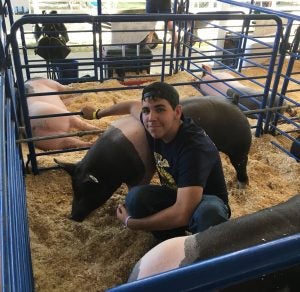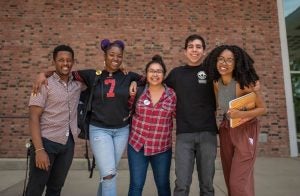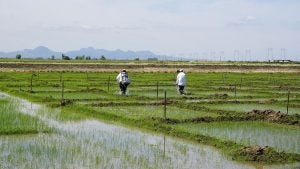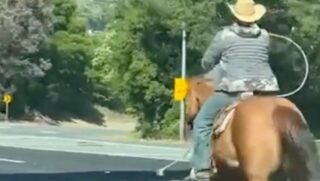When I was growing up, I wanted to be a photographer, or perhaps a graphic designer. I never thought I would be an agriculturalist.
Despite spending my youth in one of the most agriculturally prolific areas in not only California, but also the nation, I never showed a lot of enthusiasm for the agricultural industry until I was about 14. My areas of interest around the time leaned toward media arts and design. And I had never lived rurally, aside from long stays with my grandparents along the I-5 towards Harris Ranch Inn & Restaurant.
So how did I end up being a writer for an agricultural and rural lifestyle-based publication, focusing on social and diversity-related issues? How do these topics intersect? How is this relevant to agriculture? Why am I here?
These are all good questions to ask, so let’s flashback some years to start.
I was undecidedly enrolled in an agricultural mechanic’s class my freshman year of high school in Hanford, California, not knowing what it was nor that it meant I would be a part of something known as the FFA.

But this may have been one of the most impactful coincidences in my life. I grew interested in agricultural sciences and the opportunities FFA offered, such as career developmental events and public speaking opportunities.
I enjoyed competing on CDE teams, showing livestock at my county fair, and going to conferences not just for the fun overnight trips or the flashy ribbons and trophies, but because it allowed me to become a part of something bigger than myself and take pride in my accomplishments. These experiences in agricultural education helped influence me toward a career in agriculture.
When I first enrolled at California State University-Chico, I set out to major in agricultural sciences and education — largely because of my interest in agricultural literacy. But as time passed, I realized I wanted to focus on crop sciences and decided to change my major to plant and soil science. I unearthed a passion for entomology, weed science, and agrichemicals. I knew I still wanted to be in touch with agricultural literacy, but I needed to embark on my own area of interest in that field, one that I knew I could only discover by taking a non-traditional route.
Using the knowledge I gained from taking ethnic studies, behavioral and social science classes, and personal experiences, I zeroed in on social inequities in the agricultural industry. It is as important to understand the communities of people that make up and rely on the industry as it is to understand the economics and science behind agriculture.

One of our goals as farmers, ranchers, distributors, communicators, scientists, supporters, and leaders of agriculture is to make food accessible to all. We have a civic duty to ensure this. However, this is not reflected in our current society.
Food insecurity exists and is heavily associated with socioeconomic class and geographical location. Farmworkers are working tirelessly to make ends meet and ensure food reaches our tables while they struggle to supply food for their own families.
Agricultural education is most inaccessible to schools in urban communities, which tend to be dominant in communities of color. LGBTQ+ students are less likely to feel welcomed to such spaces, and Indigenous communities all over the world are being displaced due to expansion of agricultural production.
All these issues — and so many more — exist, and we as agriculturalists have a responsibility to resolve this. It is an injustice to turn a blind eye and act like these issues don’t exist. This all inspired me to declare a second major in multicultural and gender studies.
My new educational path allowed me to research social and diversity-related issues in agriculture. Such issues include food insecurity, farmworkers’ hardships, and inequalities in agricultural education and employment. I also had an internship as a public relations student assistant for the Multicultural and Gender Studies Department at Chico State as part of my major, which allowed me to rediscover my passion for media arts and design and taught me how to utilize impactful leadership and activism through public relations.

My current career goals include becoming a plant protection and pest management specialist. But I also strive to continue my research on these topics to better understand how we can resolve diversity-related issues and social inequities in agriculture and harness my public relations skills to promote these topics of agricultural literacy to marginalized communities.
Which brings me to my current position.
My purpose here is to help bring attention to these issues. To celebrate and highlight our underrepresented communities for their successes and perseverance in agriculture. To understand that the significance of our roles as agriculturalists does not exempt our industry from having flaws. It’s got plenty of flaws, and acting like it isn’t true only enables and prolongs social advancement for many of us.
I don’t plan on making my impact solely behind a screen. Wherever I go in my profession, my intersectionality comes with me. That never leaves; it’s a two-in-one deal and is a part of me. And the same goes for the rest of the agriculturalists who can relate to this. Taking space in an institution that has historically marginalized diverse communities is never easy, but it’s also another step toward progress. If it weren’t, we wouldn’t exist to tell our stories today.
I write this not as permission or justification to continue my role here, but as a way of establishing my place here and sharing what you can expect from me in the future.
The future of agriculture is bright, and I am hopeful for it. I hope my role engaging in these topics encourages everyone to think critically and interculturally. Let’s continue to have these discussions; let’s come up with solutions; let us be as united and bounded by agriculture as we truly are and let nothing stop that. It starts with you, the reader, and your commitment to understanding.
Saul Reyes serves as the 2022 American Farmland Trust Agriculture Communications Intern at AGDAILY, with a focus on helping to amplify diversity and minority voices in agriculture. An FFA alum, Reyes is now a student at California State University-Chico and is double majoring in plant and soil science and multicultural and gender studies, while minoring in intersectional Chicanx/Latinx studies and public relations. He can be found on Twitter @sreyes710.





